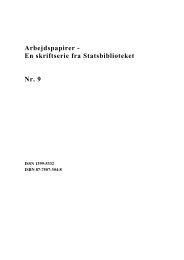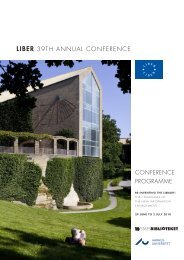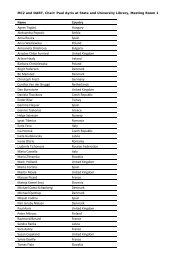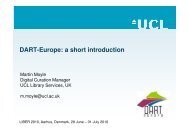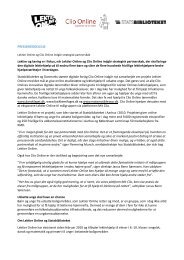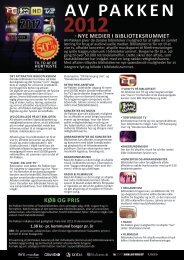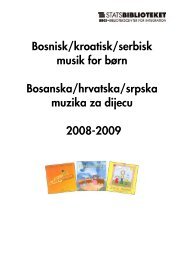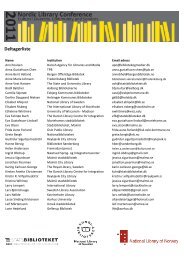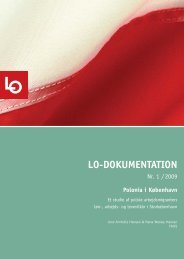Does Freedom of Information Exist in the Internet ... - Statsbiblioteket
Does Freedom of Information Exist in the Internet ... - Statsbiblioteket
Does Freedom of Information Exist in the Internet ... - Statsbiblioteket
You also want an ePaper? Increase the reach of your titles
YUMPU automatically turns print PDFs into web optimized ePapers that Google loves.
Next Library, Conference, Aarhus 2011.<br />
Time: 20 June 11:00 - 12:30<br />
Location: LAB 3 CONCERT HALL<br />
Type: Interactive Session<br />
<strong>Does</strong> <strong>Freedom</strong> <strong>of</strong> <strong>Information</strong> <strong>Exist</strong> <strong>in</strong> <strong>the</strong> <strong>Internet</strong> World?<br />
Introduction<br />
In this presentation I will focus on two issues: The consequences <strong>of</strong> electronic publish<strong>in</strong>g for<br />
libraries and <strong>the</strong> freedom <strong>of</strong> <strong>in</strong>formation on <strong>the</strong> <strong>Internet</strong>.<br />
In both cases we see a tendency that access to <strong>in</strong>formation is controlled by <strong>in</strong>terests and forces<br />
outside <strong>of</strong> <strong>the</strong> libraries, and that <strong>the</strong> freedom to access <strong>in</strong>formation is endangered.<br />
The ma<strong>in</strong> headl<strong>in</strong>es <strong>of</strong> my presentation are<br />
<br />
<br />
<br />
<br />
Publish<strong>in</strong>g and libraries<br />
Privatization <strong>of</strong> control<br />
<strong>Internet</strong> and data protection<br />
<strong>Internet</strong> and law enforcement<br />
Publish<strong>in</strong>g and libraries<br />
S<strong>in</strong>ce <strong>the</strong> end <strong>of</strong> <strong>the</strong> 90’ties, scientific journals are primarily published <strong>in</strong> electronic formats<br />
and distributed <strong>in</strong> packages, compiled ei<strong>the</strong>r by <strong>the</strong> publisher or by distribut<strong>in</strong>g agencies. We<br />
see <strong>the</strong> same development with books.<br />
The distribution <strong>of</strong> ma<strong>in</strong>stream products<br />
It is convenient and reduces transactions costs subscribe to packages <strong>of</strong> journal articles or<br />
book databases. The problem however, is <strong>the</strong> same as with television: The supplier decides<br />
what is <strong>in</strong> <strong>the</strong> package, and he may not be <strong>in</strong>terested <strong>in</strong> distribut<strong>in</strong>g <strong>in</strong>frequently used material.<br />
It fills up <strong>the</strong> database and does not give much revenue.<br />
From Collections to Connections<br />
Acquisitions are substituted by subscriptions. Libraries subscribe to an <strong>in</strong>ternet access-po<strong>in</strong>t at<br />
<strong>the</strong> publisher or distributor’s database.<br />
Libraries started a move from hav<strong>in</strong>g collections to hav<strong>in</strong>g connections. This move is not yet<br />
fully completed, as books are still primarily acquired <strong>in</strong> pr<strong>in</strong>t. We also still have some pr<strong>in</strong>ted<br />
journals. However, <strong>the</strong> end <strong>of</strong> this period is <strong>in</strong> sight. With <strong>the</strong> development <strong>of</strong> read<strong>in</strong>g devices,<br />
we are approach<strong>in</strong>g <strong>the</strong> end <strong>of</strong> <strong>the</strong> Gutenberg era.
In addition, we see libraries discard<strong>in</strong>g pr<strong>in</strong>ted material, which is available <strong>in</strong> electronic<br />
formats. The rationale <strong>of</strong> this development is tw<strong>of</strong>old: Improved services and sav<strong>in</strong>gs.<br />
Improved services and sav<strong>in</strong>gs<br />
The search and retrieval facilities <strong>in</strong> full text databases are <strong>in</strong>comparably better than earlier<br />
bibliographic searches followed by time-consum<strong>in</strong>g procedures for gett<strong>in</strong>g <strong>the</strong> material form<br />
<strong>the</strong> stacks or via <strong>in</strong>ter library loans from o<strong>the</strong>r libraries. Now users have immediate access to<br />
full text databases 24/7 <strong>the</strong> whole year.<br />
The transaction costs are m<strong>in</strong>imised. 20 years ago, <strong>the</strong> journals department had a staff <strong>of</strong> 25<br />
employees manag<strong>in</strong>g 8.000 foreign journals. Now four persons manage <strong>the</strong> subscriptions <strong>of</strong><br />
43.000 electronic journals.<br />
This development is an immense improvement <strong>of</strong> services at reduced costs. However, <strong>the</strong>re<br />
are no free meals.<br />
Privatisation <strong>of</strong> control<br />
The consequence <strong>of</strong> this move from collections to connections is that <strong>the</strong> supplier decides<br />
what is <strong>in</strong> <strong>the</strong> package, and he may not be <strong>in</strong>terested <strong>in</strong> distribut<strong>in</strong>g <strong>in</strong>frequently used material.<br />
It fills up <strong>the</strong> database and does not give much revenue.<br />
As to <strong>the</strong> content <strong>of</strong> <strong>the</strong> package, libraries will no longer be able to control <strong>the</strong> au<strong>the</strong>nticity <strong>of</strong><br />
<strong>the</strong> content or that content is not removed from <strong>the</strong> databases.<br />
Nei<strong>the</strong>r will <strong>the</strong> library be able to control long-term preservation. This is so because <strong>the</strong><br />
library no longer has physical control over <strong>the</strong> files.<br />
It will also be difficult to control conditions for access and use, because use will depend on<br />
licence agreement, and <strong>the</strong> publisher can dictate <strong>the</strong> conditions and enforce <strong>the</strong>m by <strong>in</strong>stall<strong>in</strong>g<br />
TPMs (Technical Protections Measures).<br />
Removed content<br />
It is very difficult to detect whe<strong>the</strong>r content has been tampered with, but it happens regularly<br />
that content is removed from <strong>the</strong> databases. In many cases, <strong>the</strong> content will be available from<br />
ano<strong>the</strong>r distributor, but sometimes it simply disappears.<br />
It may also happen that an author regards an earlier work as a youthful aberration whose<br />
contents or quality do not meet his present standards. If <strong>the</strong> work is published <strong>in</strong> pr<strong>in</strong>t, <strong>the</strong><br />
author can do noth<strong>in</strong>g about it. However, if it is published electronically <strong>in</strong> a database, <strong>the</strong><br />
work may simply be removed or be substituted with a new edition.<br />
Privatisation <strong>of</strong> <strong>the</strong> digital literal heritage<br />
In most countries large-scale digitisation will require private entrepreneurs (e.g. Google), or<br />
public / private partnerships. To <strong>the</strong> extent that digitisation is done by private entrepreneurs,<br />
<strong>the</strong>re will have to be room for cost recovery – also for material <strong>in</strong> <strong>the</strong> public doma<strong>in</strong>. The<br />
consequence is that private entrepreneurs will be able to control conditions for access.
The truth <strong>of</strong> <strong>the</strong> matter is that except for a few countries <strong>the</strong>re is not <strong>the</strong> political will to<br />
allocate <strong>the</strong> necessary funds. Therefore, we will see large-scale privatisation <strong>of</strong> our literal<br />
heritage.<br />
<strong>Internet</strong> and data protektion<br />
With <strong>the</strong> development <strong>of</strong> computerised process<strong>in</strong>g <strong>of</strong> personal data and <strong>the</strong> possibility to<br />
make cross-searches <strong>in</strong> several databases at <strong>the</strong> same time, <strong>the</strong>re has been <strong>in</strong>creased awareness<br />
<strong>of</strong> <strong>the</strong> need to protect privacy, In <strong>the</strong> 1980ies, many countries <strong>in</strong>troduced legislation <strong>in</strong> order<br />
to protect personal data.<br />
S<strong>in</strong>ce <strong>the</strong>n <strong>the</strong> development <strong>of</strong> <strong>the</strong> <strong>Internet</strong>, <strong>the</strong> World Wide Web, and very efficient search<br />
mach<strong>in</strong>es have <strong>in</strong>creased <strong>the</strong> political sensitivity <strong>of</strong> <strong>the</strong> issue, and <strong>the</strong> need for even stricter<br />
data protection is <strong>of</strong>ten voiced.<br />
With<strong>in</strong> <strong>the</strong> European Union <strong>the</strong> Directive 95/46/EC on <strong>the</strong> protection <strong>of</strong> personal data 1<br />
presents some serious legal problems <strong>in</strong> respect to harvest<strong>in</strong>g <strong>the</strong> <strong>in</strong>ternet. I can here only<br />
summarize <strong>the</strong> ma<strong>in</strong> problems.<br />
The ma<strong>in</strong> problem consists <strong>in</strong> <strong>the</strong> extremely wide scope <strong>of</strong> <strong>the</strong> directive. This is illustrated by<br />
<strong>the</strong> def<strong>in</strong>itions <strong>of</strong> ‘personal data’ and ‘process<strong>in</strong>g <strong>of</strong> personal data’:<br />
<br />
‘Personal data’ means any <strong>in</strong>formation relat<strong>in</strong>g to an identified or identifiable natural<br />
person (‘data subject’).<br />
<br />
‘Process<strong>in</strong>g <strong>of</strong> personal data’(‘process<strong>in</strong>g’) shall mean any operation or set <strong>of</strong><br />
operations which is performed upon personal data, whe<strong>the</strong>r or not by automatic<br />
means, such as collection, record<strong>in</strong>g, organization, storage, adaptation or alteration,<br />
retrieval, consultation, use, disclosure by transmission, dissem<strong>in</strong>ation or o<strong>the</strong>rwise<br />
mak<strong>in</strong>g available, alignment or comb<strong>in</strong>ation, block<strong>in</strong>g, erasure or destruction;<br />
Rights <strong>of</strong> <strong>the</strong> data subject<br />
The pr<strong>in</strong>cipal rules <strong>of</strong> <strong>the</strong> Directive are that<br />
The data subject should give his consent, and if <strong>the</strong> data are collected without <strong>the</strong><br />
knowledge <strong>of</strong> <strong>the</strong> data subject, he should be <strong>in</strong>formed, unless this is impossible <strong>in</strong><br />
practice.<br />
The data subject has <strong>the</strong> right to access <strong>the</strong> data<br />
Inaccurate or <strong>in</strong>complete data should be erased or rectified<br />
The process<strong>in</strong>g <strong>of</strong> sensitive data is prohibited. Sensitive data are personal data<br />
reveal<strong>in</strong>g racial or ethnic orig<strong>in</strong>, political op<strong>in</strong>ions, religious or philosophical beliefs,<br />
trade-union membership, and data concern<strong>in</strong>g health or sex life.<br />
Access to sensitive personal data may only be given for research or statistical<br />
purposes.<br />
Of course, <strong>the</strong>re are exceptions to this, and <strong>the</strong> Directive has a long list. It even allows<br />
Member States, for reasons <strong>of</strong> substantial public <strong>in</strong>terest, to lay down exceptions <strong>in</strong> addition<br />
1 Directive 95/46/EC <strong>of</strong> <strong>the</strong> European Parliament and <strong>of</strong> <strong>the</strong> Council <strong>of</strong> 24 October 1995 on <strong>the</strong> protection <strong>of</strong><br />
<strong>in</strong>dividuals with regard to <strong>the</strong> process<strong>in</strong>g <strong>of</strong> personal data and on <strong>the</strong> free movement <strong>of</strong> such data. (Official<br />
Journal <strong>of</strong> <strong>the</strong> European Communities <strong>of</strong> 23 November 1995 No L. 281 p. 31 ff.)
to those laid down <strong>in</strong> <strong>the</strong> directive, ei<strong>the</strong>r by national law or by decision <strong>of</strong> <strong>the</strong> supervisory<br />
authority. In such cases certa<strong>in</strong> procedures have to be followed.<br />
Sensitive <strong>in</strong>formation<br />
Everybody who has been surf<strong>in</strong>g <strong>the</strong> <strong>in</strong>ternet knows that <strong>the</strong> <strong>in</strong>ternet conta<strong>in</strong>s lots <strong>of</strong> personal<br />
<strong>in</strong>formation, and that a substantial proportion <strong>of</strong> this <strong>in</strong>formation is sensitive.<br />
Therefore <strong>the</strong> mere collection <strong>of</strong> <strong>the</strong> data, <strong>the</strong> harvest<strong>in</strong>g <strong>of</strong> <strong>the</strong> <strong>in</strong>ternet, requires that it is<br />
recognized to be <strong>of</strong> substantial public <strong>in</strong>terest and that a special permission is granted ei<strong>the</strong>r<br />
by national law or by <strong>the</strong> supervisory authority.<br />
Access<br />
Accord<strong>in</strong>g to <strong>the</strong> directive personal data may only be accessed for research purposes and only<br />
after permission by <strong>the</strong> supervisory authority.<br />
The consequence <strong>of</strong> this is that as long as we have not separated (sensitive) personal<br />
<strong>in</strong>formation from o<strong>the</strong>r types <strong>of</strong> <strong>in</strong>formation, <strong>the</strong> whole <strong>in</strong>ternet archive must be regarded as<br />
“sensitive”. Therefore, <strong>in</strong> pr<strong>in</strong>ciple, any access requires <strong>the</strong> permission by <strong>the</strong> supervisory<br />
authority.<br />
Digital retro conversion<br />
The Directive on <strong>the</strong> protection <strong>of</strong> personal data is very complicated and it may be<br />
implemented differently <strong>in</strong> Member States. The Nordic countries have a tradition <strong>of</strong> ra<strong>the</strong>r<br />
strict protection <strong>of</strong> personal data. However, <strong>the</strong> lesson we learnt from this was, that <strong>the</strong><br />
Directive will probably apply also for personal data created <strong>in</strong> <strong>the</strong> process <strong>of</strong> digital retro<br />
conversion <strong>of</strong> pr<strong>in</strong>ted material, e.g. newspapers, periodicals and books.<br />
<strong>Internet</strong> and law enforcement<br />
The enforcement <strong>of</strong> copyright on <strong>the</strong> <strong>in</strong>ternet has been considered difficult. The illegal data<br />
are <strong>of</strong>ten placed on servers outside <strong>the</strong> jurisdiction <strong>of</strong> <strong>the</strong> country and is <strong>the</strong>refore out <strong>of</strong> reach.<br />
However, recently users <strong>in</strong> Denmark were met by <strong>the</strong> follow<strong>in</strong>g screen (see figure next page)<br />
when try<strong>in</strong>g to l<strong>in</strong>k to Pirate Bay.<br />
STOP - Adgang h<strong>in</strong>dret<br />
Ved Københavns fogedrets kendelse af 25. oktober 2006(all<strong>of</strong>mp3.com), 15. august<br />
2007(mp3sparks.com) og 29. januar 2008(<strong>the</strong>piratebay.org) er Tele2 A/S (en del af<br />
Telenor) blevet pålagt at h<strong>in</strong>dre vores kunders adgang til www.all<strong>of</strong>mp3.com,<br />
www.mp3sparks.com og www.<strong>the</strong>piratebay.org.<br />
Fogedretskendelsen i de 3 nævnte sager kan i s<strong>in</strong> helhed hentes her:<br />
Fogedrets kendelse All<strong>of</strong>MP3<br />
Fogedrets kendelse MP3Sparks<br />
Fogedrets kendelse <strong>the</strong>piratebay.org<br />
Østre Landsrets stadfæstelse <strong>the</strong>piratebay.org<br />
Tele2 A/S har ikke foretaget nogen registrer<strong>in</strong>g af d<strong>in</strong> adgang til denne side.
Instead <strong>of</strong> try<strong>in</strong>g to seize <strong>the</strong> illegal copies, rights holders succeeded <strong>in</strong> gett<strong>in</strong>g an <strong>in</strong>junction<br />
order<strong>in</strong>g <strong>the</strong> telecommunication companies to block access to <strong>the</strong> service provider. As <strong>the</strong>re<br />
are only a few telecommunication companies <strong>in</strong> Denmark this is a relatively simple operation.<br />
The problem is that such steps may not only block for access to illegal data or services, but<br />
also for third parties legal activities. However, a third party who might be affected by <strong>the</strong><br />
court order has no say <strong>in</strong> <strong>the</strong> court’s deal<strong>in</strong>gs with <strong>the</strong> <strong>in</strong>junction. That is only an issue<br />
between <strong>the</strong> rights holder and <strong>the</strong> telecommunication company. Undesirable consequences for<br />
third parties are not considered by <strong>the</strong> court. Nei<strong>the</strong>r is <strong>the</strong> service provider, whose presumed<br />
illegal activities are blocked, part <strong>of</strong> <strong>the</strong> court’s hear<strong>in</strong>gs. 2 That happens only afterwards, at<br />
<strong>the</strong> justification proceed<strong>in</strong>gs.<br />
Virtual Schengen Border<br />
A Virtual Schengen Border is contemplated by <strong>the</strong> Law Enforcement Work<strong>in</strong>g Party. This<br />
Work<strong>in</strong>g Party was unknown to me, but a quick search on <strong>the</strong> <strong>in</strong>ternet revealed that LEWP<br />
(Law Enforcement Work<strong>in</strong>g Party) is a work<strong>in</strong>g Group with<strong>in</strong> <strong>the</strong> doma<strong>in</strong> ‘Justice and Home<br />
Affairs’ <strong>of</strong> <strong>the</strong> Council <strong>of</strong> <strong>the</strong> European Union. Accord<strong>in</strong>g <strong>the</strong> Belgian Federal Police’s<br />
homepage “The importance <strong>of</strong> <strong>the</strong> LEWP work<strong>in</strong>g group <strong>in</strong> <strong>the</strong> decision-mak<strong>in</strong>g process<br />
with<strong>in</strong> <strong>the</strong> Justice and Home Affairs Council <strong>of</strong> <strong>the</strong> EU can hardly be overestimated.” 3<br />
In <strong>the</strong> m<strong>in</strong>utes from a meet<strong>in</strong>g held <strong>the</strong> 17 th <strong>of</strong> February, we can read under <strong>the</strong> head<strong>in</strong>g <strong>of</strong><br />
“Cybercrime”<br />
“The Presidency <strong>of</strong> <strong>the</strong> LEWP presented its <strong>in</strong>tention to propose concrete measures towards<br />
creat<strong>in</strong>g a s<strong>in</strong>gle secure European cyberspace with a certa<strong>in</strong> "virtual Schengen border" and<br />
"virtual access po<strong>in</strong>ts" whereby <strong>the</strong> <strong>Internet</strong> Service Providers (ISP) would block illicit<br />
contents on <strong>the</strong> basis <strong>of</strong> <strong>the</strong> EU "black-list". Delegations were also <strong>in</strong>formed that a conference<br />
on cyber-crime would be held <strong>in</strong> Budapest on 12-13 April 2011.” 4<br />
If <strong>the</strong>se proposals are implemented it may well prove to be <strong>the</strong> most serious attack on <strong>the</strong><br />
freedom <strong>of</strong> <strong>in</strong>formation <strong>in</strong> European history after WW2.<br />
Harald von Hielmcrone<br />
State and University Library<br />
Aarhus<br />
2 Clement Salung Petersen, ”Netværksoperatørernes rolle i bekæmpelsen af ophavsretskrænkelser”, NIR, 2009<br />
nr. 1 s. 32<br />
3 http://police-eu2010.be/mu-eu2010/en/work<strong>in</strong>g-groups/police-cooperation-work<strong>in</strong>g-party/wg-lawenforcement-party/<br />
4 OUTCOME OF PROCEEDINGS <strong>of</strong>: Jo<strong>in</strong>t meet<strong>in</strong>g <strong>of</strong> <strong>the</strong> Law Enforcement Work<strong>in</strong>g Party and <strong>the</strong> Customs<br />
Cooperation Work<strong>in</strong>g Party, on: 17 February 2011, Subject: Summary <strong>of</strong> discussions. Brussels, 3 March 201,<br />
7181/11, ENFOPOL 44, ENFOCUSTOM 13



